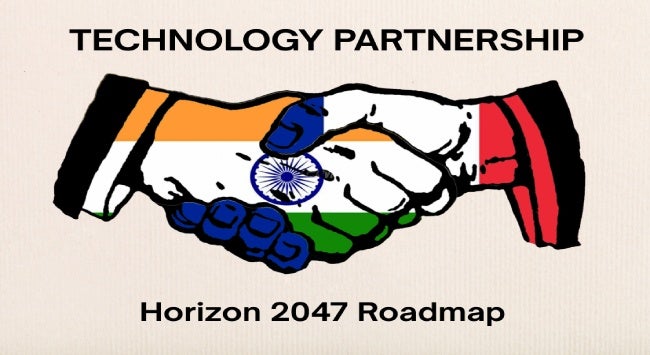India-France Technology Partnership:
Reshaping the Global Technology Order
Anirudh Suri
4 August 2025Summary
The India-France strategic partnership represents one of India’s most important, yet under-highlighted, partnerships. France and India could emerge as a key axis for creating a new technological and geopolitical world order.
India and France face urgent imperatives to work on reshaping the global technology order. They appear to be natural technology allies, seeking a more inclusive and competitive global technology order. The significant churn in the geopolitical order, coupled with growing strategic convergence, could bring about more India-France cooperation that could redound to each other’s benefit.
What has driven this bilateral convergence? And how can India and France become more robust digital partners?
Drivers of India-France Cooperation
India and France share a robust strategic partnership, driven by defence, security, nuclear, space and technology, which has seen increased bilateral cooperation. Their cooperation has received a boost due to two key drivers.
First, the United States (US)-Europe relationship, while remaining critical, is starting to show signs of cracks. The Donald Trump administration has made it clear that the transatlantic alliance will not continue in the same shape and form, and that the European countries will have to do more. This situation has compelled Europe and France, in particular, to pursue greater strategic autonomy and develop sovereign capabilities, technology and defence.
At the same time, with China getting closer to Russia, Europe’s ties with China have become strained. In these circumstances, an attractive option for Europe, and France in particular, is to deepen and broaden ties with India.
Second, France and India have complementary assets, capabilities and comparative advantages. France has a solid industrial and defence manufacturing base, with India keen to build that up. India has a large technology talent base, while France, and Europe broadly lacks the numbers on that front. India’s thriving base of software talent, large information technology services firms, telecommunication and technology giants, as well as a vibrant, thriving startup and venture capital ecosystem provide the perfect foil for France to build what could be its most important technology partnership.
Scope for Greater Convergence and Action
Besides the pillars identified by France and India in the ‘Horizon 2047 Roadmap’, a few major areas for greater convergence and joint action exist. First, France and India can help build their mutual sovereign technology capabilities. For example, both Europe and India currently do not have sovereign cloud capabilities and are largely dependent on US cloud providers or hyperscalers such as Amazon Web Services, Microsoft Azure and Google. Similarly, today, both Europe and India are dependent on global positioning systems and other key pieces of the technology infrastructure controlled by a few countries.
Subsea cable infrastructure and repair capabilities could become another key area of collaboration. France’s Alcatel Submarine Networks, recently bought over by the French government from Nokia, is a leading manufacturer and maintains over 850,000 kilometres of advanced submarine optical systems. Marseille now has 16 submarine cables landing or confirmed to land in its jurisdiction, connecting Europe, many of which to Africa and Asia. India, with its various players in telecommunication and other infrastructure, could work jointly with France to build a safer, more resilient subsea cable network in Asia and Africa.
Second, France and India should build a more competitive global technology landscape. Current trends tilt toward the concentration of technology capabilities, especially emerging technologies such as artificial intelligence (AI), in the hands of a few firms, and even fewer countries. France and India’s cooperation should, therefore, extend to helping each other build sovereign large language models. The India-France declaration on AI already has a pillar to deepen ‘research partnerships for development of broad and open and freely reusable large language models’. India and France must build further on this dimension and deepen partnerships between the open-source developer community in both countries. Specific AI startups in both ecosystems, namely, Mistral of France and Sarvam of India, could lead this effort.
Third, India and France must focus not just on joint development of large defence systems such as next-generation engines for fighter planes, but also joint development of new-age defence-technology capabilities around drones, precision warfare and cyberwarfare. Given the changing nature of warfare, they must expedite and enhance cooperation across space and maritime spatial awareness and geospatial intelligence.
To propel cooperation, India and France must build deeper ties not just at the government- to-government or business-to-business levels, but also amongst their talent, entrepreneurship and startup ecosystems. France, under President Emmanuel Macron, has demonstrated how to effectively bring French technology talent back home to build up sovereign capabilities in AI. India can implement a similar strategy. Greater collaboration between the startup ecosystems, as initiated by 10 Indian startups being hosted at the French startup incubator, Station F, could be scaled up, alongside greater mobility of students and professionals.
France and India must lay out a bold, ambitious agenda to leverage their strong ties to form a new node in a fluid global technology landscape. They can do that by offering a different vision for the structure of the global technology ecosystem. Extreme dependence on a few select firms for critical technology infrastructure or key applications is not advisable, strategically or even commercially, for the world. The France-India technology partnership could provide the vision and roadmap to engender a more level-playing field in the global technological order.
. . . . .
Mr Anirudh Suri is author of The Great Tech Game: Shaping Geopolitics and the Destinies of Nations and host of ‘The Great Tech Game Podcast’. He is also a non-resident scholar at the Carnegie Endowment for International Peace and Managing Partner of India Internet Fund, an early stage venture capital fund. The author bears full responsibility for the facts cited and opinions expressed in this paper.
Pic Credit: ISAS-NUS
-
 More From :
More From :
-
 Tags :
Tags :
-
 Download PDF
Download PDF



